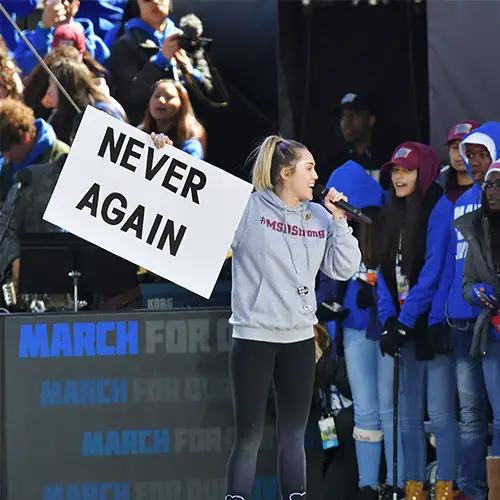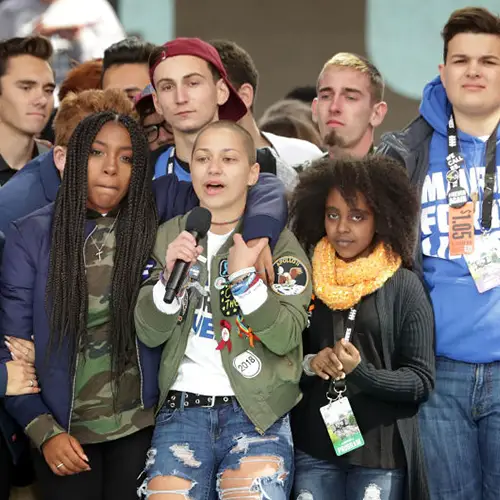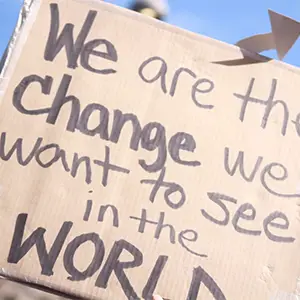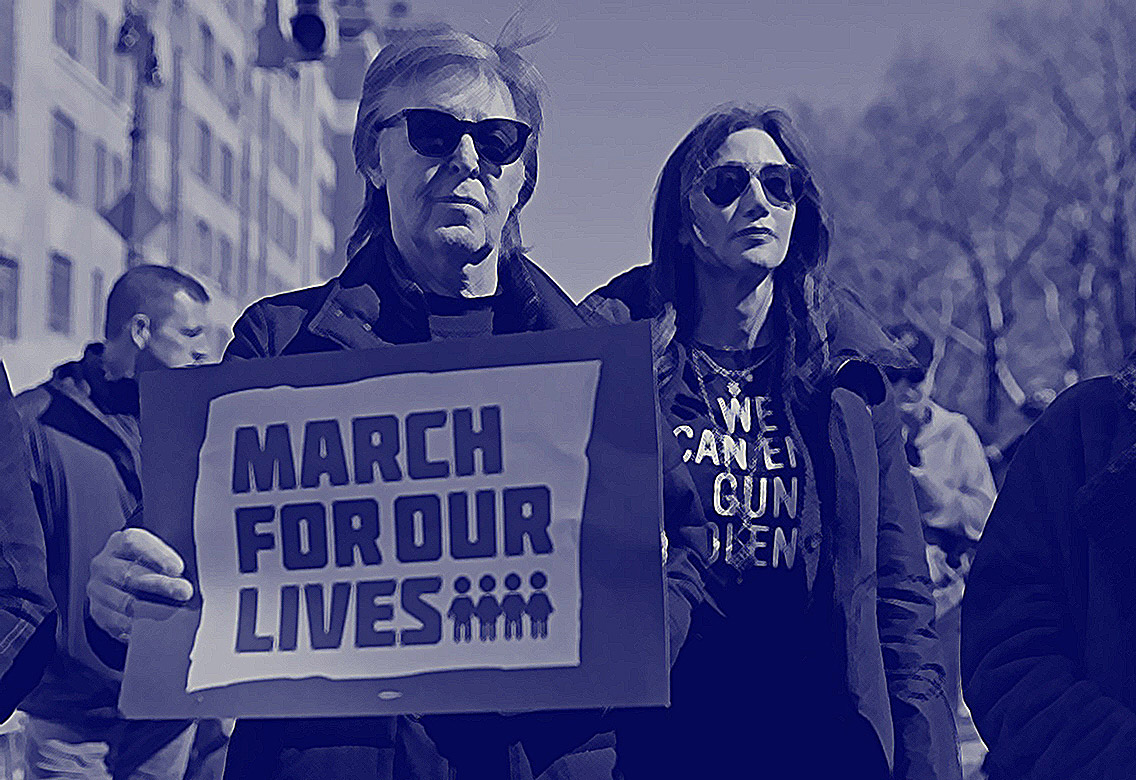[dropcap]T[/dropcap]he crowd filled the streets and I think it was the first time I’d be in a place with celebrities where they weren’t the main attraction. Less than a block from the main stage I can only tell you that I was standing next to an Amtrak sign and that any attempts to move were wholly unsuccessful. My knees were bent, trying to balance out the packed backpack on my shoulders without stepping on the two children sitting on the curb near my feet.
We Were Marching for Our Lives, After All, and Theirs in Particular
My journey to Washington, D.C. began less than a week earlier when I received an email from a student who needed a graduate assistant to accompany students on a hastily planned trip to the March. Some of the highlights she included in her email were the fact that Ariana Grande and Lin-Manuel Miranda would be performing, but I didn’t even get to that part before replying that I’d be happy to go with them – already mentally preparing myself for the 16 hours I’d spend on a bus that weekend.

The pop stars and performers are not what truly attracts humans; rather, they become something of an every-person.
There’s a balance, I think, that’s struck between those pop culture monoliths who ended up performing at the recent marches and the actual intention of the events themselves. The pop stars and performers are not what truly attracts humans; rather, they become something of an every-person. All of our lives were touched by gun violence, but the ones on stage that we were really coming to see are those that have experienced it firsthand. The Parkland victims. The Sandy Hook victims. Even, Martin Luther King Junior’s granddaughter, to some extent.
In the days following the March, which was a whirlwind for a lot of reasons, I don’t think that I let it emotionally affect me until I saw recordings on Facebook and Twitter of Emma Gonzalez, Delaney Tarr, and their classmates. These are the folks who experienced these tragedies firsthand, and their stories are both visceral and tangible. They were at Parkland. They have experienced gun violence. And, with the growing number of school shootings, there are also a growing number of survivors – individuals who have been witness to and victim of gun violence in our schools.
With the proliferation of social media and the continued importance of music in our media, pop culture plays a huge role in activism now. Listening to Lin-Manuel Miranda and Ben Platt (two artists I already love), and having listened to “Found/Tonight” as a Hamildrop (a follow-up to the Hamilton Mixtape), I was struck by this new context. The song I will now forever associate with this movement to end gun violence.
It’s a dangerous road to walk, allowing celebrities to become visible figures in the movement when they are frequently not the ones personally affected by the tragedy. Scholars have argued on this subject for many years, particularly in the realm of music and its involvement in social movements.
In a 2004 article called “When Politics Goes Pop: On the Intersections of Popular and Political Culture and the Case of Serbian Student Politics,” the author noted that:
[p]opular music can play a central role in the process because it serves as both the inter-movement and intergenerational bearer of residual culture of resistance that can be appropriated and reshaped with contemporary alternatives.
Others still remind us that “music lifts the spirits of those who are already actively involved in a movement.”
Yet, with music comes their artists, and the artists are not typically the ones who have agency in terms of the movement itself. A 2017 article from The New York Times recently noted:
Celebrities are lightning rods in a literal sense. The real work of combating bigotry is handled not by groovy street theatrics but by the hundreds of thousands of ordinary people who march and protest and call their legislators.
Contrastingly, a separate Guardian article stated:
Celebrities speaking truth to power, rather than half-truths that may inadvertently serve the interests of power, may be a more promising way forward if celebrity advocacy is to lead to meaningful socioeconomic change.
So What Can We Take Away From This?
Pop culture played a huge role in the social movements of the 1960s and has continued to do so in a similar nature since then. We love our music, and we love our celebrities. Celebrities like Angelina Jolie, Tom Cruise, and a number of others have become heavily involved in social issues, standing as representatives and advocates for countries and individuals in need.
And they’ve certainly brought more attention to these issues. Millions of people keep their fingers on the pulse on all aspects of celebrities’ lives, and so if that’s what’s leading those who would not otherwise turn on a debate, stand in solidarity at a march, or, at best, get them to a vote, then who am I to argue?

Millions of people keep their fingers on the pulse on all aspects of celebrities’ lives, and so if that’s what’s leading those who would not otherwise turn on a debate…then who am I to argue?
Yet, it’s important to ensure that celebrities and musical artists don’t see themselves as the center of the movement. I think that that’s something that was done very well at the March for Our Lives. The artists performing were all too eager to step back and allow students to tell their stories. As expected, rumors of participating celebrities combed through the crowd, but people were just as excited to see Emma Gonzalez as they were Miley Cyrus.
What it really comes down to is agency. That is, who possesses the real-life identity or experience-based ability to speak to issues in a way that directly affects one’s life? The Women’s March needs to be led by women. The March for Our Lives needs to be led by students and other victims of gun violence. They are the ones directly affected by political action on this topic, and this needs to stay at the heart of social movements today.
I Hope Activism Continues to Gain Traction, and I Hope Music Stays a Part of It
Many were moved to tears that Saturday, and music adds to that sense of solidarity…

Many have argued that marches like this don’t actually affect political change (which is a conversation for another day), but it’s great to stand among a crowd that fundamentally believes in change. Many were moved to tears that Saturday, and music adds to that sense of solidarity and sets a certain tone with the audience.
Plus, an association between music and movements will grow and change. I’m sure that I’ll never not associate “Found Tonight” with the March for Our Lives. It will stay with me, and it will stay with those that were there. Likewise, I will never forget standing in silence with Emma Gonzalez. These are jointly part of my experience, and both contributed to my commitment to ending gun violence.
Plus, I hope that celebrities stay involved because they are standing with us, and they’re lending their voices to the chant. And every person counts.




